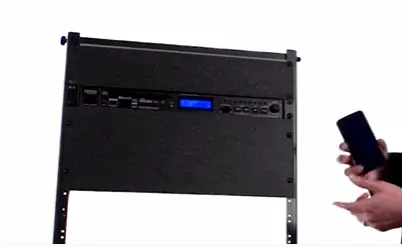The Denon receiver volume changes by itself mainly because of the old amplifier, faulty output channels, IR generates false signals, incorrect speaker impedance, remote malfunction, defective dynamic volume.
If your Denon receiver volume started to increase or decrease on its own, be sure that any of the above single or multiple factors cause this issue. Keep reading these troubleshooting tips, and you will obviously learn how to fix the volume problems yourself.
Table of Contents
Denon Receiver Volume Changes By Itself [7 Easy Solutions]
Denon receiver volume’s sudden ups and downs by itself could be an irritating issue for you. Thus, you need this troubleshooting guide that incorporates all the causes and associated solutions. Let’s start:
Note: You can also read how to fix Denon receiver Bluetooth not working.
1. Old Amplifier
Your Denon receiver volume could increase or decrease by itself because of the old amplifier. The old amp fails to perform well in terms of its function and sound quality. Thus, it may cause the volume’s sudden increase to the maximum level.
Moreover, you will also see that the volume increases or decreases on an intermittent basis. That means there are no specific patterns regarding when it will happen. Sometimes you can also experience a day without happening it.
Solution:
If the old amplifier is the culprit, you should solve it immediately. Solve your receiver’s volume-changing issue by buying a new amp.
The new amps will improve the receiver’s functioning and sound quality. Replacing your old amplifier is the best solution to this issue.
2. IR Generates Erroneous Signals
The IR generates erroneous signals because of the extreme heat in the cabinet. Too much stuff within the room causes IR signal interference.
Due to the interference, the IR could not receive and generate perfect signals. The external interfering causes the IR sensor’s signal fluctuations.
Moreover, the old amplifier also causes this issue. The old speaker starts generating too much heat and causes erroneous IR signals. However, the Denon receiver volume changed automatically when the IR developed incorrect signs.
Solution:
If you have this problem, you should move the cabinet’s stuff around. Hopefully, it will stop generating erroneous signals.
The best solution to fix this issue is to keep the Denon receiver on the cabinet’s top so that nothing can interfere with its signal.
Ensure plenty of free air movement within the cabinet. Again, replace the old speaker to prevent the excessive heating issue. And, ensure there is no external interference, which could cause the IR sensor to malfunction.
3. Amplifier’s Output Channels Malfunction
Your amplifier’s one output channels issues is enough reason to change the volume by itself. The factors that cause the output channels to malfunction are the following:
- Faulty pre-driver circuit capacitor in one of the channels
- Defective transistor
- Damaged amplifier circuit
Solution:
Contact an expert to check the amplifier’s output channel when you see the receiver itself is changing the volume. You can also go with the following solutions:
- Inspect the output channel’s pre-driver circuit capacitor and replace the faulty one
- Choose and Replace the defective transistor
- Repair and replace the amplifier circuit
4. Speaker Impedance Issues
When using the A and B speaker systems separately, you can use the 6 to 16 ohms speakers’ impedance for suing in front speakers.
But the Denon receiver’s volume can change by itself if the front speaker’s pair’s impedance is less than 12 ohms.
If you play your Denon receiver at a high volume for a long time, the protector circuit can activate. And it will create volume-changing issues. The sound change by itself when there is a lower impedance than specified connections.
Solution:
You should be careful in using the front speaker’s two pairs (A + B) simultaneously if their combined impedance is lower than 12 ohms. The other solutions are the following:
- Inspect the protector circuit and deactivate it.
- Avoid playing the Denon receiver at high volumes for an extended period.
- Make sure the front speaker’s impedance is higher than the specified connections.
5. Receivers to Speakers Incorrect Post Connect
Connecting the correct post from the Denon receiver to the speakers is essential. Otherwise, you may face the receiver’s volume-changing issue by itself. The receiver senses overload when the post is not attached to the correct position.
Due to overload sensing, the Denon receiver unit can go to protection mode or reset mode. The audio output is sensitive. Thus, it can’t take the overload. Here, the reset switch act as a safety precaution against the system’s overloading.
Solution:
Ensure that you connected the correct post from the Denon receiver to the speakers.
Hooked the receiver’s base at the right speaker’s position, such as negative to negative and positive to positive. The other solutions are the following:
- Make sure the receiver doesn’t sense the overload
- Ensure the Denon receiver is not in protection mode or reset mode
- For the right post, trace the exact wire
6. Remote Malfunction
Solution:
Take out and replace the remote’s damaged battery and see whether it fixes the issue or not. Removing the remote control’s battery will fix this issue if the malfunctioning remote is the culprit.
7. Defective Dynamic Volume
The Denon receiver’s dynamic volume determines what to do with the audio ahead. If it receives silence from the speaker, it can drop the receiver volume by itself so that the sound remains low.
The dynamic volume’s malfunction causes the Denon receiver’s volume to suddenly increase or decrease by itself.
Solution:
Contact a technician to inspect whether the dynamic volume is perfectly functioning or not. Repair the defective dynamic volume. Again, make sure the source device’s dynamic range control is not competing.
FAQs:
Are Denon speakers good?
Yes! Denon speakers are excellent, and it provides well-balanced sound. Most of the users have no complaints about it. You will enjoy the full range of high-end quality sound in Denon. Moreover, its sound output is immaculate.
How long does the Denon receiver last?
The Denon receiver’s expected longevity is 4-5 years. In short, you can expect to get a clear, high-quality sound within this expected lifespan. However, with proper care and maintenance, it could last for more years, but it depends on you.
What does an eco mode do on a Denon receiver?
When you power on the Denon receiver, it generates heat and consumes power. Thus, here comes the need for eco mode. Eco mode reduces the heat generation and power consumption on your receiver. It also reduces the power supply.
How do I know if my Denon receiver is bad?
At first, connects the Denon receiver’s front-end output with other speakers. Hear the sound from it. The receiver will produce static sound, and if not, its speaker’s sound. Hearing the sound, you can determine whether it’s terrible or not.
Is Yamaha better than Denon receiver?
The Denon receiver and Yamaha offer different unique features and high-quality full-range sound. But Denon is best compared to Yamaha because of its solid build, less expense, sufficient channels, reliability, etc. Yamaha costs more compared to Denon.
Conclusion
Now you know all the reasons why the Denon receiver volume changes by itself. Optimistically, you would now be able to solve your Denon receiver’s sound-changing problem by yourself.
Still, if you fail to solve the issue, you can comment. Comment it in the comment box, and we will try to fix it for you.


About Gonzalez
William Gonzalez is a passionate researcher & electronics expert who is dedicated to solve complex electronic issues. Plus, he has a passion for sharing his knowledge & expertise in this field with others. Well, he breaks down the complex technical concepts into simple terms & shares them with his readers so that they can easily troubleshoot the problems with their electronic products as well as save their pockets.